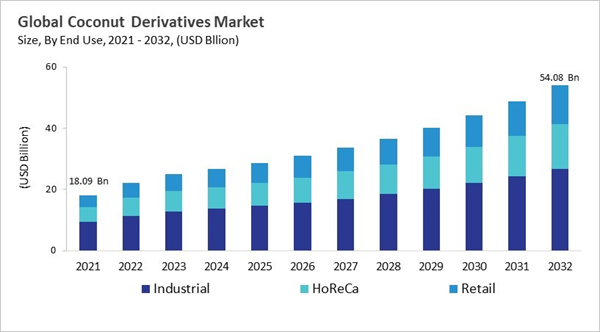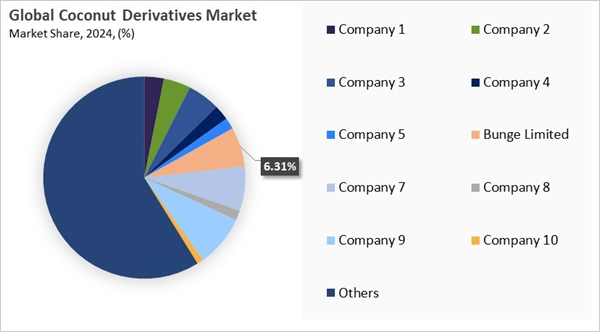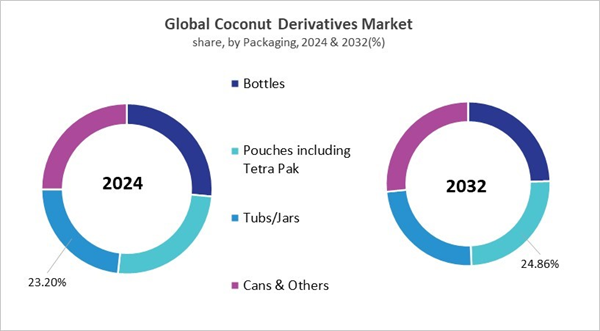Key Highlights:
- The Asia Pacific market dominated Global Coconut Derivatives Market in 2024, accounting for a 48.4% revenue share in 2024.
- The Rest of Asia Pacific market is projected to maintain its leadership in Asia Pacific, reaching a market size of USD 5.57 billion by 2032.
- Among the various End User, the Industrial segment dominated the global market, contributing a revenue share of 51% in 2024.
- In terms of Retail Type, Supermarkets/Hypermarkets segment are expected to lead the global market, with a projected revenue share of 32.98% by 2032.
- The Bottles market emerged as the leading Packaging in 2024, capturing a 26.4% revenue share, and is projected to retain its dominance during the forecast period.
- The Coconut Oil Market in Product Type is poised to grow at the market in 2032 with a market size of USD 14.70 billion and is projected to maintain its dominant position throughout the forecast period.
The coconut derivatives market has recently developed into a diverse industry covering cosmetics, food & beverages, and industrial applications. The market for coconut derivatives has witnessed a noticeable shift with the rising popularity of coconut derivatives such as coconut milk and cream in plant-based diets, coconut water as a hydration drink, and coconut oil for personal care and wellness. Further, the market revenue is also anticipated to expand due to growing usage in the industrial sector as coir and activated carbon. Producer nations like Sri Lanka, India, Indonesia, Philippines stand as global suppliers, supporting expansion in the regional markets.
The consumer demand for coconut derivatives is surging as a result of the shift towards health-driven, sustainable, and premium coconut products. Key players in personal care, food & beverages companies are embedding ethical provenance and sourcing into their branding. Furthermore, coconut producing nations are widely upgrading their supply chains, focusing towards branded and processed goods like coconut water, coir products, and virgin coconut oil. Personal care and cosmetic companies are harnessing clean-label positioning to gain market position. Traceability, sustainability, and compliance with global standards have developed as a competitive factor across all segments.
Driving and Restraining Factors
Drivers
- Rising Global Demand For Plant-Based And Natural Products
- Expanding Applications Across Food, Beverage, And Personal Care Industries
- Sustainability Commitments And Responsible Sourcing Initiatives
- Technological Advancements And Value Addition In Processing
Restraints
- Vulnerability Of Supply To Climate Change And Biological Factors
- Competition From Substitute Oils And Ingredients
- Supply Chain Fragmentation And Farmer-Level Challenges
Opportunities
- Rising Global Demand For Sustainable Packaging And By-Product Utilization
- Growth Of Functional Foods, Nutraceuticals, And Wellness Products
- Digital Commerce And Direct-To-Consumer Branding
Challenges
- Balancing Competing Uses Of Coconuts Across Multiple Value Chains
- Standardization And Quality Assurance Across Global Supply Chains
- Building Resilient And Inclusive Farmer Livelihoods
Market Share Analysis
The leading players in the market are competing with diverse innovative offerings to remain competitive in the market. The above illustration shows the percentage of revenue shared by some of the leading companies in the market. The leading players of the market are adopting various strategies in order to cater demand coming from the different industries. The key developmental strategies in the market are Acquisitions, and Partnerships & Collaborations.
COVID-19 Impact Analysis
Lockdowns in important coconut-producing countries like the Philippines, Indonesia, and India made it hard to harvest, process, and move coconut derivatives during the COVID-19 pandemic. Supply chain problems, port restrictions, rising shipping costs, and a lack of workers all caused prices and supply to be unstable. At the same time, industrial demand fell because of economic uncertainty. But as people became more health-conscious and started buying more natural and plant-based products, the demand for coconut water, milk, and virgin coconut oil grew. The rise in home cooking, the growth of e-commerce, and the stronger sustainability stories from big companies all helped the market stay strong. This set the stage for long-term recovery, even though there were short-term problems. Thus, the COVID-19 pandemic had a negative impact on the market.End User Outlook
Based on End User, the market is segmented into Industrial, HoReCa, and Retail. The HoReCa segment procured 26.5% revenue share in the market in 2024. Its growth is fueled by the increasing demand for coconut derivatives in foodservice outlets for preparing beverages, desserts, and international cuisines. Coconut milk, cream, and oil are widely used in hotels and restaurants for their flavor, texture, and nutritional value. The rising popularity of plant-based diets has also prompted chefs to incorporate coconut-based ingredients into mainstream menus.Packaging Outlook
Based on Packaging, the market is segmented into Bottles, Pouches including Tetra Pak, Tubs/Jars, and Cans & Others. The Pouches including Tetra Pak segment recorded 25.3% revenue share in the market in 2024. These packaging solutions are valued for being lightweight, eco-friendly, and cost-effective compared to rigid alternatives. Tetra Pak and similar formats provide excellent protection against light, air, and contaminants, thereby ensuring longer shelf life. Their compact design makes storage and transportation more efficient, appealing to both retailers and consumers.Regional Outlook
Region-wise, the market is analyzed across North America, Europe, Asia Pacific, and LAMEA. The Asia Pacific segment procured 48.4% revenue share in the market in 2024. The coconut derivatives market is anticipated to expand in the North America and Europe regions. This is supported by rising consumer demand for plant-based, clean-label, and natural products. The demand for coconut water has widened as a hydrating drink, driven by beverage brands. Virgin coconut oil, coconut milk, and dream are also gaining traction into gluten-free, dairy-alternative, and vegan diets. In Europe, the coconut derivatives market is driven by traceability and sustainability are key themes supporting expansion. Brand differentiation, premium positioning, and innovation in packaging and flavor are elements intensifying the competition among global and regional positioning.The coconut derivatives market in the Asia Pacific and LAMEA region is predicted to experience growth. This is due to the diverse consumption patterns and supply strength of the regions. The market growth in Asia Pacific is supported by the processing capacities of regional nations such as Sri Lanka, India, Indonesia and Philippines, leading to high availability of branded virgin oils, activated carbon, and coconut water. Key players in the region hold a strong position in hair and edible oil categories, backed by well-established supply chains. Moreover, the LAMEA coconut derivatives market is experiencing positive opportunities. Government initiatives in farmer training and replanting in order to stabilize supply, along with allowing producers to gain market positioning.
List of Key Companies Profiled
- Axelum Resources Corp.
- The Vita Coco Company, Inc.
- Marico Limited
- Thai Coconut Public Co., Ltd.
- Sambu Group
- Bunge Limited
- Cargill, Incorporated
- Nutiva, Inc.
- Wilmar International Ltd
- Greenville Agro Corporation
Market Report Segmentation
By End User
- Industrial
- HoReCa
- Retail
By Retail Type
- Supermarkets/Hypermarkets
- Online Retail/E-commerce
- Convenience/Grocery Stores
- Specialty/Gourmet Stores
- Other Retail Type
By Packaging
- Bottles
- Pouches including Tetra Pak
- Tubs/Jars
- Cans & Others
By Product Type
- Coconut Oil
- Coconut Milk
- Coconut Water
- Desiccated Coconut
- Coconut Sugar
- Coconut Flour & Fibre Derivatives
- Other Product Type
By Geography
- North America
- US
- Canada
- Mexico
- Rest of North America
- Europe
- Germany
- UK
- France
- Russia
- Spain
- Italy
- Rest of Europe
- Asia Pacific
- China
- Japan
- India
- South Korea
- Singapore
- Malaysia
- Rest of Asia Pacific
- LAMEA
- Brazil
- Argentina
- UAE
- Saudi Arabia
- South Africa
- Nigeria
- Rest of LAMEA
Table of Contents
Companies Mentioned
- Axelum Resources Corp.
- The Vita Coco Company, Inc.
- Marico Limited
- Thai Coconut Public Co., Ltd.
- Sambu Group
- Bunge Limited
- Cargill, Incorporated
- Nutiva, Inc.
- Wilmar International Ltd
- Greenville Agro Corporation











